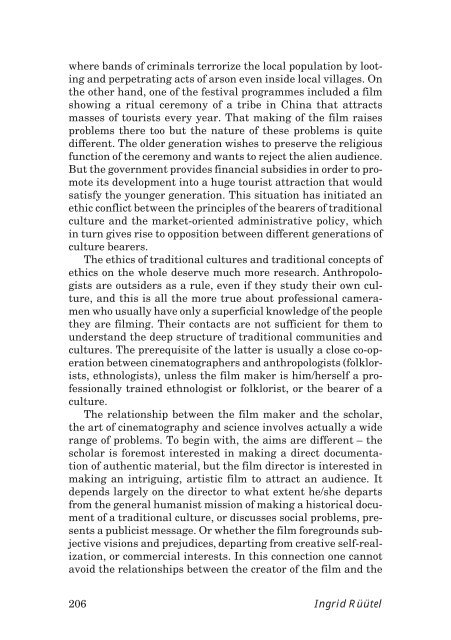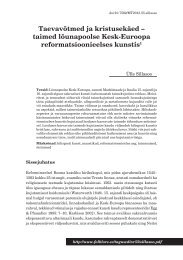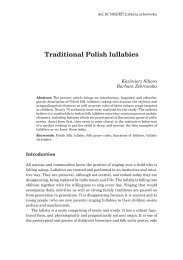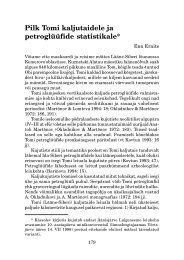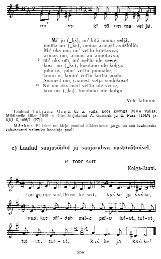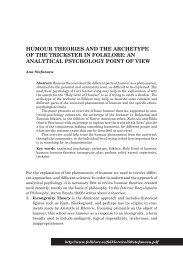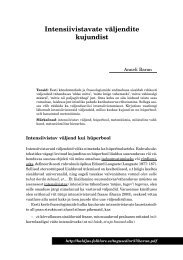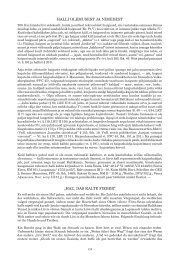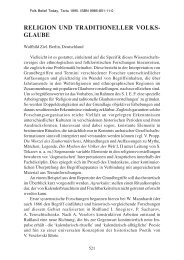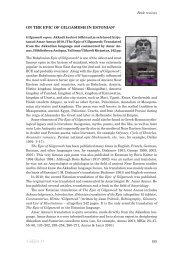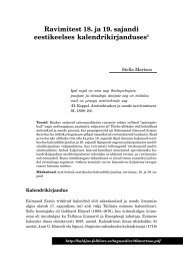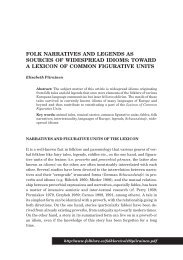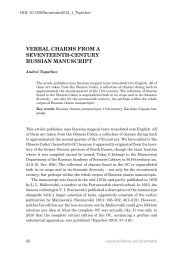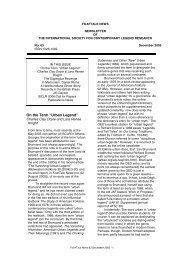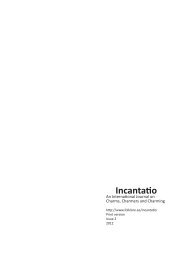- Page 2:
Media & Folklore Contemporary Folkl
- Page 5 and 6:
4 Editor Mare Kõiva Language edito
- Page 7 and 8:
6 PRESS Maarja Lõhmus 185 Mediamyt
- Page 9 and 10:
egion. The focus of her research wa
- Page 12:
ELECTRONIC MEDIA 11
- Page 15 and 16:
Arheoloogia: esimene mobiil? (Frans
- Page 17 and 18:
nachgerade peinlich. 4 Das Handy er
- Page 19 and 20:
erweist sich die Akzeptanz (je nach
- Page 21 and 22:
Handyaficionado, der im Herrenpisso
- Page 23 and 24:
Unheimlichen, vor dem Numinosum tec
- Page 25 and 26:
Handystories sind dabei gewisserma
- Page 27 and 28:
ief, nicht mehr fertig wird (cf. Aa
- Page 29 and 30:
Das hier waltende Prinzip der Dämo
- Page 31 and 32:
en, ob seine Kinder nicht die Schul
- Page 33 and 34:
games, wie ich sie einmal nennen m
- Page 35 and 36:
der permanenten Erreichbarkeit sind
- Page 37 and 38:
scheinbare, denn sie steht in keine
- Page 39 and 40:
Tuczay, Christa & Hirhager, Ulrike
- Page 41 and 42:
erreichen (Schneider 1996). Die tec
- Page 43 and 44:
de Magazine bemühen sich darum, ei
- Page 45 and 46:
Des weiteren geht es in 8 Texten um
- Page 47 and 48:
Die extraterristische Technik greif
- Page 49 and 50:
3. eine zweiteilige Geschichte zum
- Page 51 and 52:
Hörerschaft über das Radio an dem
- Page 53 and 54:
52 ich einfach mal auf den Boden zu
- Page 55 and 56:
gemeinde direkt angesprochen, wenn
- Page 57 and 58:
Der Geschichte dürfte die folgende
- Page 59 and 60:
und Realistische (Bausinger 1981).
- Page 61 and 62:
Reumann, Kurt 1996. Journalistische
- Page 63 and 64:
population had used computer, by Se
- Page 65 and 66:
They realised that along with the i
- Page 67 and 68:
considerably, is gradually weakenin
- Page 69 and 70:
diers and the metaphysical brotherh
- Page 71 and 72:
game-shows is the smallest on Frida
- Page 73 and 74:
with the highest ratings. The prese
- Page 75 and 76:
Tests of strength and skill are clo
- Page 77 and 78:
home pages of today’s young peopl
- Page 79 and 80:
Competitive game-shows in the Eston
- Page 81 and 82:
seen, go behind the scenes of the s
- Page 83 and 84:
From television show to children’
- Page 85 and 86:
the players’ own preferences are
- Page 87 and 88:
86 a piece of cloth. On its inside.
- Page 89 and 90:
... and the winners are ... 88 Pict
- Page 91 and 92:
Games reflect our cultural surround
- Page 93 and 94:
Hanson, Raimo 1998d. Muulased vaata
- Page 95 and 96:
Lipponen, Ulla 1995. Tüdrukute pla
- Page 97 and 98:
Tali, Piret 1996. Kuidas käia reis
- Page 99 and 100:
For closer study, the internet web
- Page 101 and 102:
lore, smilies, chatroom aliases (Ve
- Page 103 and 104:
language communities. The spread of
- Page 105 and 106:
neighbours (Kõiva 2008b; for more
- Page 107 and 108:
ASCII one-liners Bat \-o-/ Caterpil
- Page 109 and 110:
News groups and mailing lists Follo
- Page 111 and 112:
Screenshot from the oldest and bigg
- Page 113 and 114:
In conclusion, all observed groups
- Page 115 and 116:
Kõiva, Mare & Kuperjanov, Andres &
- Page 117 and 118:
Reinaus, Reeli 2008. Pärimusliku a
- Page 119 and 120:
118
- Page 121 and 122:
120
- Page 123 and 124:
122 from the rest of creation, that
- Page 125 and 126:
4. Websites Containing Mostly Links
- Page 127 and 128:
The hope was to break through the w
- Page 129 and 130:
attention. Then the world discovere
- Page 131 and 132:
is the bodily posture the experienc
- Page 133 and 134:
132 coming the god into cyberspace,
- Page 135 and 136:
Even the codenames that shamanistic
- Page 137 and 138:
136 In the course of direct percept
- Page 139 and 140:
138 and naturally being a wonderful
- Page 141 and 142:
140 by Cielle on February 25, 1999,
- Page 143 and 144:
Lilly, John C. 1968. Programming an
- Page 145 and 146:
The Internet provides several techn
- Page 147 and 148:
etain their locality, and a limited
- Page 149 and 150:
thorough parting from many people m
- Page 151 and 152:
duties, such as for instance act ou
- Page 153 and 154:
Folklore on the Internet: About the
- Page 155 and 156: FOLKLORE SPREAD VIA INTERNET Here w
- Page 157 and 158: 156 The FCC released a warning last
- Page 159 and 160: THE EVERYDAY-USERS Folklore about o
- Page 161 and 162: on the disc. Stories about people w
- Page 163 and 164: On-Line Medicine. Communication and
- Page 165 and 166: All large medical online portals ha
- Page 167 and 168: NARRATIVITY IN THE DOCTOR-PATIENT F
- Page 169 and 170: 168 Drugs can only be proscribed wh
- Page 171 and 172: 170 but for example whether the con
- Page 173 and 174: In the diabetes online community, t
- Page 175 and 176: similar minds among work colleagues
- Page 177 and 178: initiator is the story of a kid’s
- Page 179 and 180: 178 few times and then refused, the
- Page 181 and 182: CONCLUSION It is easy to see how di
- Page 183 and 184: Discussion 2008 = discussion thread
- Page 185 and 186: 184
- Page 187 and 188: In order to study the main problems
- Page 189 and 190: ings. The struggle in a closed soci
- Page 191 and 192: y the author who him/herself become
- Page 193 and 194: 2, the stronger the structural inco
- Page 195 and 196: Lotman, J. 1984. Tekst v tekste [Te
- Page 197 and 198: per stories and whole horror books
- Page 199 and 200: LOCAL NEWS The shock-provoking rash
- Page 201 and 202: impression that there were casualti
- Page 203 and 204: suggests is so common that even in
- Page 205: Heilmann, Klaus 1990. Die betrogene
- Page 209 and 210: teristic feature of Soviet ethnogra
- Page 211 and 212: graphic means. The director of A Vi
- Page 213 and 214: 212 Scenes from the film “Funeral
- Page 215 and 216: On the other hand, the public expre
- Page 217 and 218: Proverbial Expressions, the Local P
- Page 219 and 220: and drinks being supplied by local
- Page 221 and 222: made for independence. This was in
- Page 223 and 224: Zealand, and parts are available on
- Page 225 and 226: said: A newspaper tries to walk the
- Page 227 and 228: Pyrrhic victory 22 . Drawing a line
- Page 229 and 230: 228 Front page of “Belfast Telegr
- Page 231 and 232: ers in the game and everything to p
- Page 233 and 234: Catholic Church made a plea for all
- Page 235 and 236: on The Queen’s Highway 53 , empha
- Page 237 and 238: a deservedly notorious reputation u
- Page 239 and 240: References Belfrage, Sally 1987. Th
- Page 241 and 242: the French phrase “Voilà un homm
- Page 243 and 244: “Meri” as my search words on th
- Page 245 and 246: age not by state authorities but by
- Page 247 and 248: “PROVERBS ARE NOT POPULAR THESE D
- Page 249 and 250: OWN AND FOREIGN, OLD AND NEW The oc
- Page 251 and 252: All in all, a total of 182 proverbs
- Page 253 and 254: sions; he is the author of modifica
- Page 255 and 256: the writers of letters are concerne
- Page 257 and 258:
erbs occurring in the Economy colum
- Page 259 and 260:
We can also observe how the same pr
- Page 261 and 262:
260 Male (163) Female (38) Gender u
- Page 263 and 264:
262 Repetition is the Mother of Wis
- Page 265 and 266:
264 Väiksed vargad ripuvad võllas
- Page 267 and 268:
the beginnings of the texts (The
- Page 269 and 270:
Mieder, Wolfgang 1983. Verwendungsm
- Page 271 and 272:
270
- Page 273 and 274:
ferred by the tabloids and the hist
- Page 275 and 276:
death. Alongside innumerable refere
- Page 277 and 278:
276 Diana and Dodi RIP God Bless yo
- Page 279 and 280:
eligious overtones in the presentat
- Page 281 and 282:
patron saint of Britain.” Others
- Page 283 and 284:
Wales,” and, of course, her telev
- Page 285 and 286:
eligious group who see themselves a
- Page 287 and 288:
Brierley, P. (Ed.) 1998-1999. UKCH
- Page 289 and 290:
Legends Connected with the Sinking
- Page 291 and 292:
Andres Kõnno has analyzed the medi
- Page 293 and 294:
only exception here is a biographic
- Page 295 and 296:
With the help of the media, an aura
- Page 297 and 298:
together; the fact was also pointed
- Page 299 and 300:
... damaging the international repu
- Page 301 and 302:
300 and told them about it. But his
- Page 303 and 304:
ger. He had been seen distributing
- Page 305 and 306:
The belief that a close person coul
- Page 307 and 308:
In today’s world the Titanic, or
- Page 309 and 310:
his songs. It was often pointed out
- Page 311 and 312:
moted by contemporary pop culture -
- Page 313 and 314:
Peegel, Juhan 1976. Eesti rahvuskor
- Page 315 and 316:
World Trade Center which was destro
- Page 317 and 318:
ETHNOLOGICAL ASPECTS OF COMMEMORATI
- Page 319 and 320:
318 A cross-tree in the Urvaste cro
- Page 321 and 322:
groom of one couple and the bride o
- Page 323 and 324:
dig up the graves of soldiers who w
- Page 325 and 326:
of m/s Estonia. Only a few people w
- Page 327 and 328:
326 their life there. The place whe
- Page 329 and 330:
victims of drowning but no further
- Page 331 and 332:
The largest known memorial was erec
- Page 333 and 334:
By the Tartu-Võru road, approximat
- Page 335 and 336:
REFERENCES TO THE MONUMENTS IN ESTO
- Page 337 and 338:
administration calls for removal of
- Page 339 and 340:
338 away is almost the same as goin
- Page 341 and 342:
have personal a connection with the
- Page 343 and 344:
Acknowldegements The author wishes
- Page 345 and 346:
Sikk, Rein 1998. Mälestuskivide pa
- Page 347 and 348:
346
- Page 349 and 350:
348 Contra at the Kaika summer univ
- Page 351 and 352:
THE THREE TENORS OF VÕRU COUNTY Ne
- Page 353 and 354:
clusion that cover can have a diffe
- Page 355 and 356:
354 It would be easier to imagine t
- Page 357 and 358:
lack of musical talent, his perform
- Page 359 and 360:
358 Music that tries carefully to i
- Page 361 and 362:
360 The three Võru tenors Contra,
- Page 363 and 364:
Information imbedded in melody (and
- Page 365 and 366:
that the creative force of people i
- Page 367 and 368:
366 Once I walked with gentlemans S
- Page 369 and 370:
368 & n œ & œ & c œ J œ J œ œ
- Page 371 and 372:
Example 3. Tüütu kärbes [Boring
- Page 373 and 374:
372 Valgre Raimond is at the bus st
- Page 375 and 376:
374 siis loodame, et mööda ta lä
- Page 377 and 378:
2. Kuldpagunites huntamees on mära
- Page 379 and 380:
378 Sest vägivald teeb veriseks ja
- Page 381 and 382:
380 Taive Särg
- Page 383 and 384:
Example 10. Killukesi yesterdayst [
- Page 385 and 386:
Example 11. Korraks vaid [For a (sh
- Page 387 and 388:
Comment The mid-1990s were an inter
- Page 389 and 390:
Kangilaski, Jaak 1995. Postmodernis
- Page 391 and 392:
Information Transmission on the Bor
- Page 393 and 394:
392 the ministers walked around the
- Page 395 and 396:
394 In the author’s opinion when
- Page 397 and 398:
ing to them they displayed a certai
- Page 399 and 400:
Obviously, in addition to the rumou
- Page 401 and 402:
Tõhela-Murru Russian Orhthodox Chu
- Page 403:
EKLA f 199 m 30. Ajaloolist tradits


